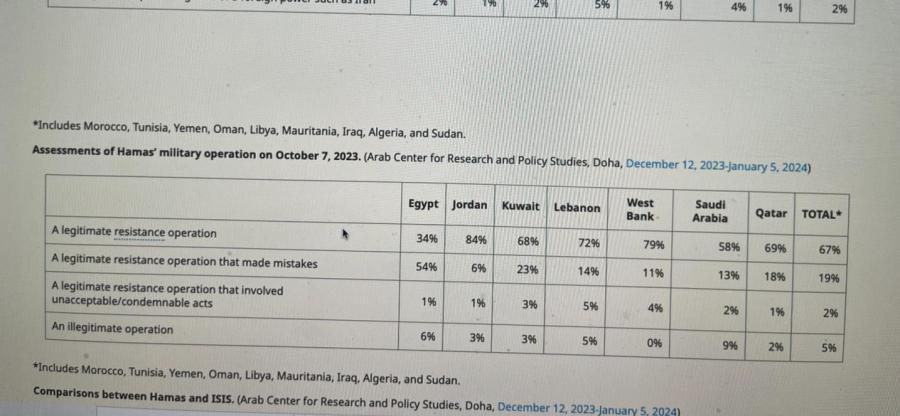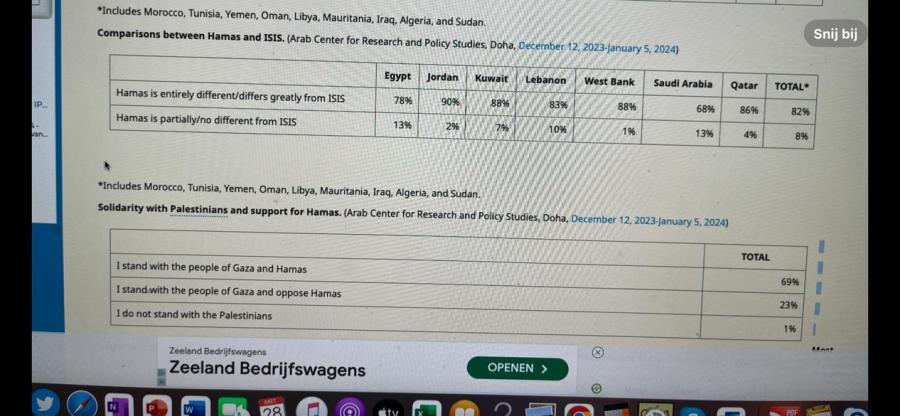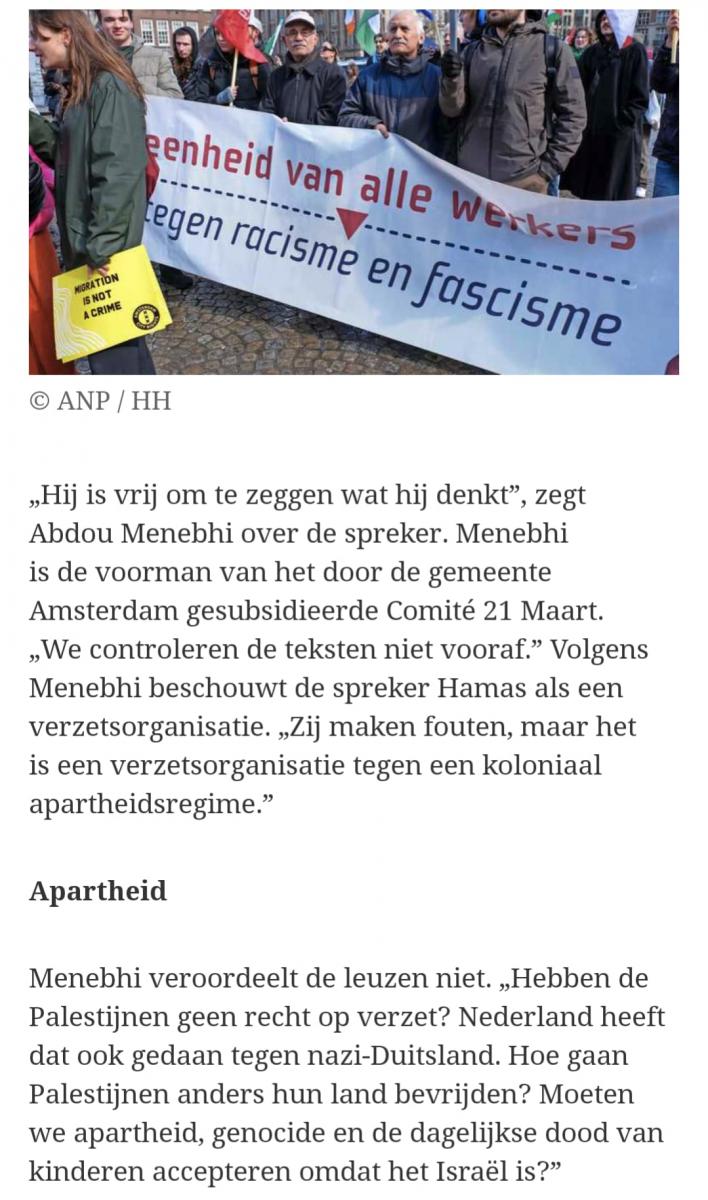‘De bewondering van Arabieren voor 7 Oktober’ -een nadere analyse
‘De bewondering van Arabieren voor 7 Oktober’ -een nadere analyse
In een artikel in De Telegraaf van maandag 24 maart, gaf ik het volgende commentaar op een demonstratie van het 21 maart Comité:
‘Alom bewonderen Arabieren wat Hamas deed die dag. Eindelijk hun verdiende loon, is de algemene reactie. Dat wordt in vele opzichten gesteund’.
Op deze opmerking kreeg ik stevig commentaar en mij werd om bronnen gevraagd waarop ik me baseer. De hoofdmoot van het commentaar was dat ik niet kon waarmaken dat Arabieren de actie van Hamas bewonderen en dat dat ook niet geldt voor de meerderheid van de Arabieren. Ik laat een aantal van die bronnen hier de revue passeren om vervolgens terug te komen op beide vragen.
Bron 1 staat op deze link.
Het gaat om de volgende citaten:
Positive views of Hamas receive a jump while remaining the minority opinion among Saudi citizens; most agree that Israel is “weak and divided.”
A Washington Institute poll conducted from November 14 to December 6, a nationally representative sample of 1,000 Saudi citizens measured how Saudi attitudes have shifted due to the Israel-Hamas war. According to responses, the Saudi popular attitude towards the outcome of the war is clear: the overwhelming majority (91%) express agreement with the statement that “despite the destruction and loss of life, this war in Gaza is a win for the Palestinians, Arabs, and Muslims.” And as for the role of the broader Arab world, almost all (96%) agree with the proposal that “Arab countries should immediately break all diplomatic, political, economic, and any other contacts with Israel, in protest against its military action in Gaza.”
While Hamas as a movement remains unpopular among the majority of Saudis—in contrast to a new trend of widespread popular support in countries like Lebanon, Jordan, and Egypt—just 16% of Saudis say that “Hamas should stop calling for the destruction of Israel, and instead accept a permanent two-state solution to the conflict based on the 1967 borders.”
Nor do most believe that Hamas’s attack on October 7 targeted Israeli civilians—the overwhelming majority of Saudis (95%) responded that Hamas did not actually kill civilians when asked about whether they believed the Hamas killing of civilians was against Islam. This view is widespread across the eight countries polled by TWI, and similar results appear in a recently released poll of Palestinians from PSR. There, the overwhelming majority reported that they had not seen any videos of Hamas members committing atrocities, and only 10% of Palestinians (17% of Gazans and 5% of West Bankers) stated that they believed that Hamas committed war crimes in the current war, in comparison to 95% who say the same about Israel.
Yet in contrast to countries like Lebanon, Jordan, and Egypt—where Hamas has a majority and in several cases unprecedented level of approval since 2014—Hamas remains less popular among Saudis than when polled after the 2014 conflict.
Bron 2 staat op deze link.
Het gaat om de volgende gegevens (zie tabellen op screenshots):


Bron 3 staat op deze link. Het gaat dan om deze gegevens:
‘Most of the questions asked in this last quarter of 2023 revolved around the October 7 offensive and the subsequent Israel-Hamas war and ground invasion of the Gaza Strip. It also covered the debate about the future of the Gaza Strip after the war and the Palestinian perception of the positions of the various relevant countries and actors. Findings indicate that a majority of the respondents believe that Hamas' decision to carry out the offensive is correct, and believe that the attack came in response to “settler attacks on Al-Aqsa Mosque and West Bank residents, and for the release of Palestinian prisoners.” It is worth noting that there are significant differences between the attitudes of the residents of the West Bank compared to those of the Gaza Strip, in terms of the “correctness” of the Hamas' decision (and other matters), as the attitudes of Gazans tend to show a greater degree of skepticism about that decision. It is clear from the findings that believing in the “correctness” of Hamas' decision does not mean support for all acts that might have been committed by Hamas fighters on October 7. The overwhelming majority of respondents say that they have not seen videos from international or social media showing atrocities committed by Hamas members against Israeli civilians that day, such as the killing of women and children in their homes. Indeed, more than 90% believe that Hamas fighters did not commit the atrocities contained in these videos. When asked what is or is not allowed in war, under international humanitarian law, the findings indicate that the vast majority believes that attacking or killing civilians in their homes is not permissible. The majority (except in the Gaza Strip) also believe that taking civilians as hostages or prisoners of war is also not permissible.
Hamas’ decision to launch the October the 7th offensive: We asked respondents to speculate about Hamas’ reasons for waging its October the 7th offensive: a response to attacks on al Aqsa and to release prisoners as Hamas claimed or an Iranian plot to thwart Arab normalization with Israel. The overwhelming majority (81%; 89% in the West Bank and 69% in the Gaza Strip) said it was a “response to settler attacks on AlAqsa Mosque and on Palestinian citizens and for the release of prisoners from Israeli prisons;” while only 14% (5% in the West Bank and 27% in the Gaza Strip) thought it was an Iranian plot. We asked the respondents what they thought of Hamas’ decision to launch the October the 7th offensive given its outcome so far, a vast majority (72%; 82% in the West Bank and 57% in the Gaza Strip) said it was a correct decision and 22% (12% in the West Bank and 37% in the Gaza Strip) said it was incorrect.
Bron 4: Op Facebook zijn er talloze sites die hun felle haat uitspreken tegen Israël en hun steun aan Hamas, zoals de pagina van de Nederlandse Badr Youyou:
Tekst: 'Moge God de zionisten, hun nakomelingen en hun helpers uitroeien en in hel verstrooien samen met de Nazi's, de Farao en alle andere tirannen, amen.'
En deze foto op zijn site:

Bron 5 Tenslotte veroordeelt Abdou Menebhi van het Comité 21 maart de leuzen die gebezigd werden op de manifestatie niet zoals uit onderstaand screenshot blijkt van het artikel in de Telegraaf.

Eindoverwegingen
Het woord ‘bewonderen’ komt in de gegeven bronnen niet voor en als zodanig dien ik me te verantwoorden op de vraag of het gebruik van dat woord terecht was. De diverse polls laten een beeld zien dat de meeste ondervraagden in de Arabische wereld in grote of minder grote mate akkoord zijn met de actie van Hamas op 7 oktober. Mensen in Saoedi-Arabië zijn evenwel niet erg te spreken over Hamas in het algemeen, in tegenstelling tot respondenten in Egypte, Jordanië en Libanon. Opvallend is dat nogal wat informanten in de diverse polls bestrijden dat Hamas zich vergrepen had aan burgers. Ze hadden immers geen beelden van dien aard gezien. Dat laatste verbaast me omdat dergelijke beelden verschenen op allerlei YT-video’s. De diverse polls laten in zijn algemeenheid een beeld zien van instemming met de acties van Hamas.
Maar kun je dan zo ver gaan om te stellen dat de informanten in de polls de actie van 7 oktober bewonderen? Ikzelf heb op basis van de date deze conclusie getrokken maar ik moet op deze plaats ook toegeven dat het woord ‘bewonderen’ ‘admire’ niet in de data voorkomt, althans niet in de diverse vragen die in de polls werden gesteld, maar ik heb wel de vrijheid genomen om instemming met de acties te interpreteren als bewonderen. Dat laatste is dus mijn interpretatie en de kritiek op het gebruik van dat woord is dus in zekere zin terecht. Instemmen hoeft nog niet hetzelfde te zijn als bewonderen. Tegelijkertijd stel ik vast dat de grens tussen beide woorden diffuus is en kwam ik tot het definitieve gebruik van het woord op basis van de vele haatdragende FB-pagina’s waarvan ik er een noemde.
Wat betreft de vraag naar de algemeenheid van de instemming met (de daden van) Hamas stel ik op basis van bovenstaande polls vast dat dat in de meeste gevallen geldt voor de meerderheden in de polls, behalve in de eerste waar de Saoedi’s niet erg enthousiast zijn over Hamas. Deze relativering wil ik zodoende dus ook graag maken.
Mijn huidig commentaar kan gezien worden als een uitvergroting van de realiteit; ik hoop dat de -relatieve- relativering in dit stuk helderder maakt waar ik sta en ik zal in het debat de komende tijd nog meer rekening houden met de nodige nuances.
Tenslotte vraag ik mijn criticasters mij op een respectvolle manier te benaderen want wat dat betreft verdienden de reacties niet de schoonheidsprijs. Verre van dat.